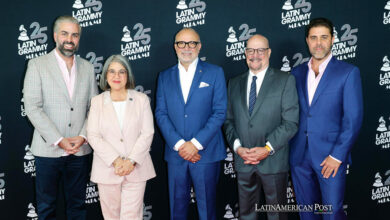World Cup 2030 surprises: Chile wants to be another co-host
Listen this article
It began with Uruguay and Argentina, then Paraguay, now Chile, and even Bolivia has been an option. Is the Conmebol initiative for the World Cup strengthened?

South America is determined to organize the 2030 Soccer World Cup. It will not be easy, they know, and that is why they are betting to be stronger in the face of the possible candidacies of the United Kingdom, Morocco's alliance, perhaps with Spain or Portugal, and China. The truth is that what began only with Uruguay —because of the romanticism that implies that the first organizers of the event repeat as hosts just 100 years later— has been totally transformed. Is it for good? Let's hope so. Here I give my point of view of the situation.
Leer en español: Chile: el as bajo la manga para el mundial 2030
We know that the political aspect has a great impact on long-range sporting events, and that relationships are very important as they are in different areas of life. Uruguay, as we said, was the father of the idea, then and intelligently invited Argentina to accompany him, taking advantage of the greater infrastructure of the neighboring nation, an indispensable condition to house 48 teams. All this was due to the close link between Tabaré Vásquez and Mauricio Macri, the highest authorities of those countries.
Then Macri invited Horacio Cartes, at that time Paraguay's president, with whom he had a great friendship, so that the three of them could take the project forward, also taking advantage of the soccer tradition of these three nations. In principle, the alliance caused annoyance in Uruguay, although it finally gave way; with Chile, it was different. Not so with Bolivia, which already expressed interest in joining the group through its president Evo Morales, but apparently was late to the distribution.
Read also: The battle to host the World Cup in its centenary began
Is it positive that Chile joined the candidacy?
Today the southern nation is very solid economically, and its adhesion is a benefit from the logistic point of view, in addition to that, it lightens a lot of responsibility and weight to Argentina, which would clearly be the main seat of the previous triumvirate. It was 'announced' that Sebastián Piñera's offer would be well seen by the other three members.
Beyond the economic aspect, Chile has come out with a good score of its most recent organizations of sporting events such as the Copa América 2015 and the South American Sub 20, finished recently. Thus, CONMEBOL informed FIFA, as appropriate, the modification of its candidacy, as now they are four countries.
Alejandro Dominguez, head of the highest governing body of soccer in South America, said when asked about the issue that the effort of these countries, beyond the difficulties, will be important to achieve the task.
Los Pdtes de la República Argentina, Mauricio Macri; de la República de Chile, Sebastián Piñera; de la República del Paraguay, Mario Abdo; y de la República Oriental del Uruguay, Tabaré Vázquez; acordaron presentar su candidatura conjunta para organizar la Copa del Mundo 2030
— Sebastian Piñera (@sebastianpinera) 14 de febrero de 2019
Los mandatarios,a través de las 4 respectivas Asociaciones de Fútbol (AFA, ANFP, AFP y AUF), decidieron elevar a la FIFA, previa comunicación a la CONMEBOL,la posición compartida para celebrar el centésimo aniversario de la primera Copa del Mundo, organizada por Uruguay en 1930
— Sebastian Piñera (@sebastianpinera) 14 de febrero de 2019
Hace unos meses le propuse a los Pdtes de Argentina,Uruguay y Paraguay incorporar a Chile, y en conjunto,postular a la organización del Mundisl de Fútbol 2030. Esta propuesta fue aceptada por los 3 países y tb por la ANFP chilena.Despues del mundial del 62 Chile tendrá una Nva Op
— Sebastian Piñera (@sebastianpinera) 14 de febrero de 2019
The other candidacies
After submitting its feasibility plan on February 20, the joint candidacy of Conmebol should study the rival candidates from other continents, and it is regarding that where this writer believes it will be difficult to achieve the goal, even when Chile's adhesion raises a little the posibilities. For example, Europe would support the United Kingdom, including Northern Ireland, in its desire to organize the World Cup which will be in 11 years and which would also be supported by Theresa May herself. They have not organized the event since 1966, more than 50 years, maybe it is time for the 'Inventors of Soccer' to return as organizers.
Let's not forget Morocco, which in the last election for 2026 lost to the might of the United States, Canada and Mexico. FIFA is seduced by the idea of a World Cup in Africa, in addition to the economic health of that country, the high possibility of merging with Spain and Portugal, and from our point of view, the FIFA's in debt feeling to them, makes them an extremely strong candidate. This only if they decide to run for it, especially because of the attractiveness that implies a first World Cup organized between two continents.
The fourth possible candidate is China, a nation with a gigantic impact in business and marketing, and that has been flirting with the possibility of organizing the World Cup for years while its league grows significantly and its teams try to do the same. Presumably, the Asian country has already been talking to companies close to FIFA such as Wanda, Mengiu Group, Vivo and Hisense for a hypothetical support, before the agency visits them in May and decide whether or not to endorse his candidacy. Another big rival. As we see, there are no small adversaries.
For now, the Uruguay-Argentina-Paraguay-Chile candidacy should prepare very well to present a formal report to the FIFA authorities, with all the details of investment, logistics and infrastructure. That could help make this initiative more attractive than the mere fact that 100 years of the first world cup in history, celebrated in Uruguay, is commemorated, because, only with that reason, it will be very difficult to convince them. More now that the 211 member countries of the soccer governing body have a say in the decision.
My theory is that FIFA will end up giving them the headquarters of one of the Copa América close to the World Cup, either 2028 or 2032. As a South American, I want to be wrong, I hope I'm wrong. We will wait and see.
LatinAmerican Post | Onofre Zambrano
Translated from "Mundial 2030: ¿es favorable que Chile se haya sumado a la candidatura sudamericana?"





